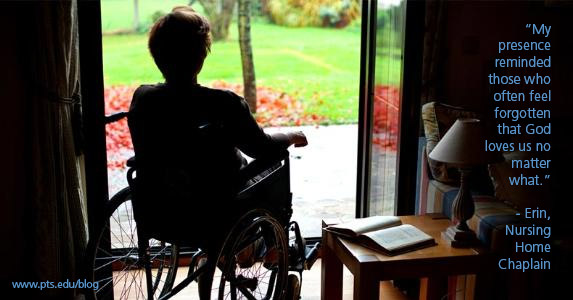After graduating with my M.Div./MSW from Pittsburgh Theological Seminary in 2005 I was excited to see how I would use both degrees. I discovered that my passion and degrees aligned in continuing care/nursing home chaplaincy. The ministry for which my M.Div. prepared me theologically coupled with the skills gained through my masters in social work program was a perfect fit. I spent the next five years engaged in ministry that shocked, excited, frustrated, and empowered me. And I saw God at work in powerful ways in the staff and residents of my community.
Preaching in non-traditional locations, like nursing homes, prisons, hospitals, and businesses, gives pastors two different opportunities. If you are called in as a virtual stranger to offer a message to virtual strangers, you are called to offer hope from outside of their normal daily routine. But if you are the pastor/chaplain who is present daily, preaching becomes like breathing to your congregation. It is a natural outpouring of the week and time you have spent together.
I spent the first year of my ministry trying to fit traditional preaching into my time at the continuing care community. I led three-five worship services a week. These worship services ranged from a memory support service to a service with our independent living residents weekly. Learning as I had in seminary that preaching was the most important part of worship, I spent time researching and writing as I was taught. But the more involved I became in the life of the residents and staff, I realized something was changing.
As I spent eight hours a day five-seven days a week in our residents homes, apartments, and rooms my ministry began to radically change. I began to understand that I was sharing the word of God with people constantly. I began to see that my presence reminded those who often feel forgotten that God loves us no matter what. It became clear to me that preaching was happening every moment of every day-in each family meeting, staff meeting, visit, and worship service. Preaching was not an isolated event that happened three-five times per week. Preaching occurred constantly and our times of worship were all of us gathering together and remembering all the ways God had been faithful to us throughout the week. The words I preached each week, were reminders of God’s faithfulness and a call to do it all again, together.
So, my preaching and worship preparation changed. I began to understand that spending hours in my office preparing was not a faithful use of my time. I needed to be out, with the residents and staff. I still was faithful in my preaching, I still spent time, but not in the manner that was prescribed to me in seminary. I read to them from the children’s Bible. I told them the stories they loved and needed to hear. I met them exactly where they were, and I knew that place so well, because I worked to engage all the staff and residents daily.
Non-traditional ministries and locations often allow pastors to engage with their congregations more often and more intimately. This provides for an exciting opportunity to share the gospel and sermons in a more personal way.
The Rev. Erin Davenport is a 2005 alumna of the MDiv program. Through the Seminary’s joint degree program, she also earned her MSW from the University of Pittsburgh. A former chaplain, she now resides in Pittsburgh and serves as the Seminary’s director of the Miller Summer Youth Institute


When hold services at the home where I am the chaplain ,I try to talk on a subject that they can see or hold .I have a group of residents how range from total alzhimers to live in residence. My hardest part in preparing a message is to find a subject that they will connect to . Any ideas are welcome
In Hs Service
James thanks for your comment. I found that I needed to tailor the message to the audience in the continuing care setting. If you services are combined (meaning the full range-from Alzheimer’s support to independent living) than I would suggest that you do a lot of recitations with the entire group during each service such as the Lord’s Prayer, 23rd Psalm, John 3:16. In addition I would sing very familiar songs (even if you don’t particularly like them): Gloria Patri, In the Garden, Amazing Grace, Great Is Thy Faithfulness, Count Your Blessings, etc. I would also suggest using a children’s bible to tell the great stories of the faith. I found this most effective in the nursing home and assisted living setting. What I have found to be absolutely true is that regardless of the degree of Alzheimer’s disease a person is suffering there is (in my experience) always some recognition of those songs and words from childhood that give our parishioners great hope!
I just wanted to take a moment to thank you for your dedication. It makes a real difference in people’s lives to have company during their most difficult and painful times it brightens their spirits and brings them closer to god.
Hello,nice share.
Thank you for your work in the nursing homes. I appreciate your writing about your experience. Your words encourage. Thanks also for the tip on using a children’s Bible to tell stories.
I am glad to be one of the visitors on this great site and appreciate it for putting up.
As a retired minister, I enjoy worship and preaching in nursing home. Go where the joy is!!!
Greetings! My name is sister Iris M. I am new here. I work in a Nursing home, and I love to preach the Gospel on Sunday and starting this new month Bible studies. Thank you for the feedback which I did take notes and will apply. Bless you all.